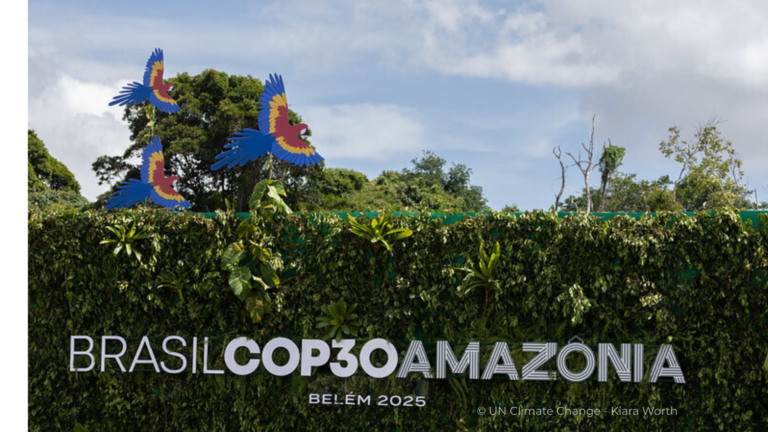Brazil’s LGMA Coordination Group advances multilevel agenda for COP30
On 19 May 2025, ICLEI South America virtually promoted the second Meeting of the National Coordination Group of the Local Governments and Municipal Authorities (LGMA) Constituency for COP30. The meeting brought together representatives of subnational government networks, state consortia, international organizations and partner institutions committed to building climate federalism in Brazil.
Recognized as an official channel for articulation between subnational governments and the UNFCCC, the initiative continues the multilevel coordination process that began in March 2025. The objective is clear: Contribute to strengthening Brazil’s role as a global reference in decentralized climate governance.
The LGMA Brazil meetings aim to create a strategic space for the convergence of subnational voices in the preparations for COP30, inspired by initiatives such as CHAMP (Coalition for High Level Ambition Multilevel Partnership) and the guidelines of the COP30 Presidency letters released throughout the process.
The group has been advancing in the construction of a common agenda coordinated between subnational governments, networks and institutional partners. The meetings have promoted the exchange of information, the proposal of collaborative activities and the debate on shared priorities that reflect the interests and challenges of Brazilian territories in international climate negotiations.

Brazilian networks and institutions contribute to COP30
The second meeting of the LGMA Brazil National Coordination Group marked another important step in strengthening the articulation between Brazilian networks and institutions towards COP30. The meeting’s main objectives were:
- Receive strategic updates on COP30 preparations from both the Federal Government and the Conference Presidency, with a focus on the participation of the LGMA Constituency;
- Receive strategic updates on LGMA Global discussions and priorities;
- Initiate the collaborative construction of an integrated calendar of national and international events, identifying opportunities for qualified influence by subnational governments in the preparatory process for COP30;
- Exchange information and collaboratively map organizations that are systematizing climate solutions and good practices of subnational governments, with the potential to be made visible and expanded during COP30;
- Begin mapping positions and declarations in preparation, representing the interests and perspectives of subnational governments regarding the Conference’s priority themes.
The meeting reinforced the strategic role of LGMA Brazil as a platform for articulation and consensus building among subnational actors, contributing to a qualified and representative participation of Brazil in COP30, with a focus on concrete climate action, multilevel governance and the appreciation of territorial experiences.
Subnational networks can contribute in the spirit of mutirão
The articulation of the National Coordination Group of the LGMA Constituency for COP30 in Brazil is aligned with the guidelines expressed in the official letters from the COP30 presidency, which have been guiding the country’s performance as host of the conference.
Already in the first letter, published in March, the Brazilian Presidency invites the international community to unite in a “Global Action” against climate change. Inspired by the ancestral wisdom of Brazil’s indigenous peoples, the mutirão is a collective, decentralized and non-hierarchical mobilization based on self-determined contributions that come from the territories and connect to the global climate agenda.
“If, instead, we choose to organize ourselves in collective action, we will have the possibility of rewriting a different future. Change by choice gives us the chance for a future that is not dictated by tragedy, but rather by resilience and agency toward a vision that we ourselves design,” reads the first letter from the COP30 Presidency.
A second letter, released on 8 May, marks the transition from vision to action. In it, the Presidency proposes four fronts of action to structure preparations until November:
- Global Mobilization, through the Mutirão;
- Climate Action Agenda, with priority themes;
- Formal UNFCCC negotiation process;
- Dome of Leaders;
The letter also calls on all sectors to act as“levers of transformation”, putting into practice real, high-impact solutions, from different scales and capabilities.
A third letter from the presidency, published on 23 May 2025, deepens this movement and guides Brazil’s positioning in the context of the 62nd Session of the UNFCCC Subsidiary Bodies (SB62), in Bonn, reinforcing the link between climate ambition, social justice and implementation. The document calls on negotiators to act as co-builders of a new global infrastructure of trust, with a focus on concrete results that are relevant to people’s real lives.
According to the third letter, “the abstractness of our work needs to start to resonate in concrete experience. Legitimacy will come from real-world relevance and delivery of results.”
By proposing a shift towards implementation, the COP30 Presidency underlines that subnational protagonism is not only about listening but about delivery of concrete actions, which start from the territories and engage in dialogue with the multilateral system in a strategic and transformative way.







